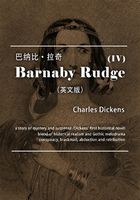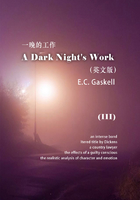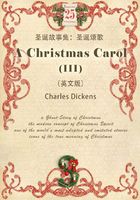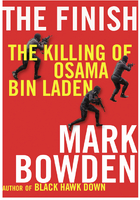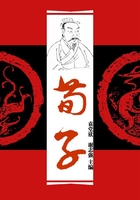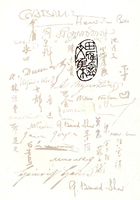He was laughing, chin up, and shaking his head. God the Father was exploding in his face with a glory of sunlight through painted glass, a glory that moved with his movements to consume and exalt Abraham and Isaac and then God again. The tears of laughter in his eyes made additional spokes and wheels and rainbows.
Chin up, hands holding the model spire before him, eyes half closed; joy —
'I've waited half my life for this day!'
Opposite him, the other side of the model of the cathedral on its trestle table stood the chancellor, his face dark with shadow, over ancient pallor.
'I don't know, my Lord Dean. I don't know.'
He peered across at the model of the spire, where Jocelin held it so firmly in both hands. His voice was bat-thin, and wandered vaguely into the large, high air of the chapter house.
'But if you consider that this small piece of wood — how long is it?'
'Eighteen inches, my Lord Chancellor.'
'Eighteen inches. Yes. Well. It represents, does it not, a construction of wood and stone and metal —'
'Four hundred feet high.'
The chancellor moved out into sunlight, hands up to his chest, and peered round him. He looked up at the roof. Jocelin looked sideways at him, loving him.
'The foundations. I know. But God will provide.'
The chancellor had found what he was looking for, a memory.
'Ah yes.'
Then, in ancient busyness, he crept away over the pavement to the door and through it. He left a message, in the air behind him.
'Mattins. Of course.'
Jocelin stood still, and shot an arrow of love after him. My place, my house, my people. He will come out of the vestry at the tail of the procession and turn left as he has always done; then he will remember and turn right to the Lady Chapel! So Jocelin laughed again, chin lifted, in holy mirth. I know them all, know what they are doing and will do, know what they have done. All these years I have gone on, put the place on me like a coat.
He stopped laughing and wiped his eyes. He took the white spire and jammed it firmly in the square hole cut in the old model of the cathedral.
'There!'
The model was like a man lying on his back. The nave was his legs placed together, the transepts on either side were his arms outspread. The choir was his body; and the Lady Chapel where now the services would be held, was his head. And now also, springing, projecting, bursting, erupting from the heart of the building, there was its crown and majesty, the new spire. They don't know, he thought, they can't know until I tell them of my vision! And laughing again for joy, he went out of the chapter house to where the sun piled into the open square of the cloisters. And I must remember that the spire isn't everything! I must do, as far as possible, exactly what I have always done.
So he went round the cloisters, lifting curtain after curtain, until he came to the side door into the West End of the cathedral. He lifted the latch carefully so as not to make a noise. He bowed his head as he passed through, and said as he always did interiorly, 'Lift up your heads, Ο ye Gates!' But even as he stepped inside, he knew that his caution was unnecessary, since there was a whole confusion of noise in the cathedral already. Mattins, diminished, its sounds so small they might be held in one hand, was nonetheless audible from the Lady Chapel at the other end of the cathedral, beyond the wood and canvas screen. There was a nearer sound that told — though the components were so mixed by echo as to be part of each other — that men were digging in earth and stone. They were talking, ordering, shouting sometimes, dragging wood across pavement, wheeling and dropping loads, then throwing them roughly into place, so that the total noise would have been formless as the noises of the market place, had not the echoing spaces made it chase round and round so that it caught up with itself and the shrill choir, and sang endlessly on one note. The noises were so new, that he hurried to the centre line of the cathedral in the shadow of the great west door, genuflected to the hidden High Altar; and then stood, looking.
He blinked for a moment. There had been sun before, but not like this. The most seeming solid thing in the nave, was not the barricade of wood and canvas that cut the cathedral in two, at the choir steps, was not the two arcades of the nave, nor the chantries and painted tomb slabs between them. The most solid thing was the light. It smashed through the rows of windows in the south aisle, so that they exploded with colour, it slanted before him from right to left in an exact formation, to hit the bottom yard of the pillars on the north side of the nave. Everywhere, fine dust gave these rods and trunks of light the importance of a dimension. He blinked at them again, seeing, near at hand, how the individual grains of dust turned over each other, or bounced all together, like mayfly in a breath of wind. He saw how further away they drifted cloudily, coiled, or hung in a moment of pause, becoming, in the most distant rods and trunks, nothing but colour, honey-colour slashed across the body of the cathedral. Where the south transept lighted the crossways from a hundred and fifty foot of grisaille, the honey thickened in a pillar that lifted straight as Abel's from the men working with crows at the pavement.
He shook his head in rueful wonder at the solid sunlight. If it were not for that Abel's pillar, he thought, I would take the important level of light to be a true dimension, and so believe that my stone ship lay aground on her side; and he smiled a little, to think how the mind touches all things with law, yet deceives itself as easily as a child. Facing that barricade of wood and canvas at the other end of the nave, now that the candles have gone from the side altars, I could think this was some sort of pagan temple; and those two men posed so centrally in the sundust with their crows (and what a quarry noise and echo as they lever up the slab and let it fall back) the priests of some outlandish rite — Forgive me.
In this house for a hundred and fifty years, we have woven a rich fabric of constant praise. Things shall be as they were; only better, richer, the pattern of worship complete at last. I must go to pray.
And then he was aware that he would not go to pray yet, even on this great day of joy. And he laughed aloud for pure joy, knowing why he would not go, knowing as of old, the daily pattern; knowing who was hunting, who preaching, who deputising for whom, knowing the security of the stone ship, the security of her crew.
As if the knowing was cue for entry in an interlude he heard a latch lift in the north-west corner and a door creak open. I shall see, as I see daily, my daughter in God.
Sure enough, as if his memory of her had called her in, she came quickly through the door, so that he stood, waiting with his blessing for her as always. But Pangall's wife turned to her left, lifted a hand against the dust. He had only time to glimpse the long, sweet face, before she had gone up the north aisle instead of coming straight across; so that he had to think his blessing after her. He watched her with love and a little disappointment as she passed the unlighted altars of the north aisle, saw her pull back her hood so that the white wimple showed, got a glimpse of green dress as the grey cloak swung back. She is entirely woman, he thought, loving her; and this foolish, this childish curiosity shows it. But that is a matter for Pangall or Father Anselm. And as if she recognised her own folly he saw how she circled the pit quickly, one hand up against the dust, crossed the nave and clashed the door of the Kingdom behind her. He nodded soberly.
'I suppose, after all, it must make some difference to us.'
After the clash of the door there was near-silence; then in the silence, a new little noise, tap, tap, tap. He turned to his left, and there the dumb man sat on the plinth of the north arcade in his leather apron, the lump of stone between his knees.
Tap. Tap. Tap.
'I think he made you choose me, Gilbert, because I stand still so much!'
The dumb man got quickly to his feet. Jocelin smiled at him.
'Of all the people connected with this thing, I must seem to do least, don't you think?'
The dumb man smiled doglike, and hummed with his empty mouth. Jocelin laughed back, delightedly, and nodded as if they shared a secret.
'Ask those four pillars at the crossways if they do nothing!'
The dumb man laughed and nodded back.
'Soon I shall go to pray. You may follow me there, sit quietly, and work. Bring a cloth with you for the chips and dust, or Pangall will sweep you out of the Lady Chapel like a leaf. We mustn't fret Pangall.'
Then there was another new noise. He forgot the dumb man and listened, with his head turned to one side. No, he said to himself, they can't have done it yet; it can't be true! So he hurried away into the south aisle where he could peer slantwise across the cathedral into the north transept. He stood by the corner of the Peverel chantry. He whispered with joy too deep for the open air.
'It's true. After all these years of work and striving. Glory be.'
For they were doing the unthinkable. I have walked by there for years, he thought. There was outside and inside, as clearly divided, as eternally and inevitably divided as yesterday and today. The smooth stone of the inside, patterned and traced with paint, the rough and lichened stuff of the outside; yesterday, or a Hail Mary ago, they were a quarter of a mile apart. Yet now the air blows through them. They touch, those separated sides. I can see, as through a spyhole, right across the close to the corner of the chancellor's house, where perhaps Ivo is.
Courage. Glory be. It is a final beginning. It was one thing to let him dig a pit there at the crossways like a grave for some notable. This is different. Now I lay a hand on the very body of my church. Like a surgeon, I take my knife to the stomach drugged with poppy.
And his mind played for a while with the fancy of the drug, thinking that the thin sound of mattins was the slow breathing of the drugged body where it lay stretched on its back.
There were young voices on the other side of the chantry.
'Say what you like; he's proud.'
'And ignorant.'
'Do you know what? He thinks he is a saint! A man like that!'
But when the two deacons saw the dean looming over them, they fell to their knees.
He looked down, loving them in his joy.
'Now, now, my children! What's this? Backbiting? Scandal? Denigration?'
They bent their heads and said nothing.
'Who is this poor fellow? You should pray for him, rather. But there.'
So he seized two handfuls of curls and tugged them gently, turning up first one white face and then the other.
'Ask the chancellor for a penance concerning this matter. Understand the penance rightly, dear children, and it will be a great joy to you.'
He turned away from them, to walk up the south aisle; but there was still another delay. Pangall stood at the temporary door that led through the wood and canvas screen from the south ambulatory into the crossways; and now, seeing Jocelin, he dismissed his attendant sweepers and limped forward, left foot dragging a little, broom held crossways in his hands.
'Reverend Father.'
'Not now, Pangall.'
'Please!'
Jocelin shook his head, and made to pass round; but the man held out a roughened hand as if he would dare to lay it on the dean's cassock. Jocelin stopped, looked down and spoke quickly.
'What d'you want, then? The same thing as before?'
'They —'
'They are not your business. Understand that once and for all.'
But still Pangall stood his ground, looking up under his thatch of dark hair. There was dust on his brown tunic, his crossgartered legs, his old shoes. There was dust on his angry face. His voice was hoarse, with dust and anger.
'The day before yesterday they killed a man.'
'I know. Listen, my son —'
Pangall shook his head with such solemnity and certainty, that Jocelin fell silent, looking down, mouth open. Pangall grounded the handle of his broom, and stood with his weight on it. He looked round the pavement, then up at the dean's face.
'One day, they will kill me.'
For a while they were both silent, among the singing that the echo made of the work noises. The dust danced in the sun between them. All at once Jocelin remembered his joy. He dropped both his hands on the man's leather shoulders and gripped tight.
'They shan't kill you. No one shall kill you.'
'Then they will drive me out.'
'No harm shall come to you. I say so.'
Pangall gripped the broom fiercely. He put his weight on both feet. His mouth twisted.
'Reverend Father, why did you do it?'
Resignedly Jocelin let his hands fall and clasped them before his waist.
'You know as well as I do, my son. So that this House will be even more glorious than before.'
Pangall showed his teeth.
'By breaking the place down?'
'Now stop, before you say too much.'
When Pangall answered, it was like an attack.
'Have you ever spent the night here, Reverend Father?'
Gently, as to a little one.
'Many nights. You know that as well as I do, my son.'
'When snow falls and all that weight lies on the lead roof; when leaves choke the gutter —'
'Pangall!'
'My great-great-grandfather helped to build it. In the hot weather he would roam through the roof over the vault up there, as I do. Why?'
'Softly, Pangall, softly!'
'Why? Why?'
'Tell me then.'
'He found one of the oak logs smouldering. By the luck of his wit he carried an adze with him. If he went for water the roof would have been ablaze and the lead like a river before he could get back. He adzed out the embers. He made a hole you could hide a, a child in; and he carried the embers out in arms that were roasted like pork. Did you know that?'
'No.'
'But I know it. We know it. All this —' And he made a jab with his broom at the dust-laden moulding — 'this breaking and digging up — let me take you into the roof.'
'I've other things to do and so have you.'
'I must speak with you —'
'And what d'you suppose you're doing now?'
Pangall took a step back. He looked round at the pillars and the high, glittering windows as if they could tell him what to say.
'Reverend Father. In the roof. Just by the door from the stair in the south-west turret there is an adze, sharpened, tallowed, guarded, ready.'
'That's well done. Wise.'
Pangall made a gesture with his free hand.
'It's nothing. It's what we are for. We've swept, cleaned, plastered, cut stone and sometimes glass, we've said nothing —'
'You've all been faithful servants of the House. I try to be one myself.'
'My father, and my father's father. And the more so since I'm the last.'
'She's a good woman and wife, my son. Hope and be patient.'
'They've made a game of my whole life. And more. It's not just this — Come and see my cottage.'
'I've seen it.'
'But not in the last few weeks. Come quickly —' and limping, hurrying with a beckoning hand, his broom trailing from the other, Pangall led the way into the south transept. 'It was our place. What will become of us? There!'
He pointed through the little door into the yard that lay between the cloisters and the south aisle. Jocelin had to bow his skullcapped head to pass through it. He stood just inside the door with Pangall under his left shoulder, and he let his jaw drop at the work that had been done. The yard was full of stacks and piles of cut stone. They reached up to the windows between the buttresses. What space the stones left was filled with baulks of timber and the passage between them was no more than a catwalk. On the left of the entrance was a bench against the south wall, with a thatched cover. Glass, and lead strip was heaped up under the thatch, and two of the master builder's men were working there, chink, snip, snip.
'D'you see, Father? I can scarcely find my own door!'
Jocelin edged after him between the piles.
'This is all they've left me. And for how long, Father?'
In front of the cottage there was left a space no bigger than a chantry, and the wall at the end of it was puddled with slops. Jocelin looked curiously at the cottage since he had never been as close to it before. On earlier inspections, a courteous glance through the door into the yard had been sufficient; for when all was said, church property or not, the yard and the cottage was Pangall's kingdom. Daily the shadow of that cottage lay on the south east window — like a monument built against the architect's intentions. Now the substance of the cottage was close to his eye, another coming together of inside and out. The cottage hung in the angle of the yard against the cathedral wall, like the accretions under the eaves of an ancient house, where generations of swallows and sparrows have left their marks and the roots of nests. It was a building at once furtive, secret, and blatant; built without permission, tolerated, tacitly unmentioned, because the family that lived there was indispensable. It concealed one buttress and part of a window. Some of the wall was grey cathedral stone, and nearly as old as the stones of the cathedral itself. There was a paradoxical dripstone with no window to protect. Some of the wall was ancient beam, wattle and daub. There were wafer thin bricks older than the cottage or the cathedral, loot turned up in some cold harbour that the Romans had not seen for a thousand years. A bit of the roof was lapped most expensively in lead; another bit in slates that bore an absolute likeness to the slates roofing the kitchen of the Vicars Choral. Then there was thatch, but so decayed, it was nothing but a sloughed and weedy undulation. A dormer window had been shaped deliberately to take a rectangle of what looked like painted glass, no less; but the other window was smaller and filled with horn. After no more than a hundred and fifty years, the piecemeal construction gave the cottage an air of antiquity and fatigue. The whole thing sagged like the thatch, as though its random parts had slumped together in a position of final rest.
Jocelin looked at the cottage, glanced sideways at the piles of building material that crowded round it, one insolence attacking another.
'I see.'
Before he could say more, a voice began to sing sweetly in the cottage. Goody came out, saw him, stopped singing, smiled sideways and emptied a wooden bucket at the foot of the south wall. She went in again; and once more he heard her sing.
'Now Pangall. All these things you have said. We are old friends, you and I, despite our different stations, so let's be practical. They will build, and that's the end of it. Tell me what's really the matter.'
Pangall looked quickly away at the men who were whistling and snapping glass. Jocelin leaned down.
'Is it your good wife? Do they work too near her?'
'Not that.'
Jocelin thought for a moment, nodding wisely at the man. He spoke softly.
'Do they treat her as some men will treat women in the street? Call after her? Speak lewdly?'
'No.'
'Then what?'
Anger had gone out of Pangall's face. There was a kind of puzzled pleading in it.
'It's this, when you come down to it. Why me? Isn't there anyone else? Why must they make a fool of me?'
'We must be patient.'
'All the time. Everything I do. They jeer and laugh. If I look behind me —'
'You're too thinskinned, man. You must put up with it.'
Pangall set his face.
'How long?'
'They'll be a trial to us all. I admit that. Two years.'
Pangall shut his eyes and groaned.
'Two years!'
Jocelin patted his shoulder.
'Now think, my son. The stones will go up bit by bit, and the wood. They won't be forever snapping glass in your face. Then the spire will be done and our House more wonderful still.'
'I shan't see it, Reverend Father.'
'Why not, in the name of —'
He stopped, aware of his sudden irritation; but then as he looked at the man eye to eye, the irritation came back in a sudden flurry. For he saw the words in Pangall's head, as clearly as if they had been written there; because there are no foundations, and Jocelin's Folly will fall before they fix the cross on the top.
He set his teeth.
'You are like all the rest; not like the old man with the adze. You haven't any faith.'
But Pangall was looking down. He crept close in Jocelin's shadow. His dusty thatch, his brown and dung-colour and dust was six inches below Jocelin's face, and leaning inward, close to the cassock. Through his irritation, Jocelin heard a hoarse and private mutter.
'How can I bear it? They strike me where I haven't any guard. I'm ashamed before people, before my own wife; it adds up in here, and each day, each hour —'
There was a sharp tap on the instep of Jocelin's shoe; and as he looked he saw a wet star there with arms to it and tiny globes of water that slid off the dubbin into the mud of the yard. Impatiently, he let out his breath, and looked round for something to say. But the sunlight on stone drew his eye upward, to the empty air above the crossways, where the battlements of the stump tower waited for the master builder and his men. He remembered the workmen breaking up the pavement below the crossways and his irritation vanished in a return of excitement.
'Be patient I said! And I promise you this. I shall speak to the master builder.'
He patted the leather shoulder again and hurried away, edging between the piles of wood and stone. The workmen at the bench kept their backs to him. He ducked through the little door into the south transept, and stood for a moment, blinking in the dusty sunlight. He saw how paving slabs were piled to one side at the crossways, and how the two delvers stood over ankles below the floor. Beyond them in the north wall, a larger patch of the outworld was visible, so that he could see to the thatched shelter among the graves, where the treetrunks lay ready. He stood, smiling round his nose, head up, and he saw Adam Chaplain come hurrying towards him up the south aisle, with a letter in his hands; but he waved him aside.
'Later, dear man. When I have prayed.'
So he went quickly, smiling, with joy like wings, through the south ambulatory between the choir and the vestry. The service was over and there was no one about but two vicars choral, standing and talking by the inner door. In the Lady Chapel the priedieu had been set ready for him on the centre line. He bent to the altar then sank kneeling in the priedieu. Somewhere near, he could hear the dumb man begin to tap and scrape gently on stone. But he hardly had to put the thin noises away from him, since joy was its own prayer, and immediate to the heart.
What can I do on this day of days when at last they have begun to fashion my vision in stone, but give thanks?
Therefore with angels and archangels —
Joy fell on the words like sunlight. They took fire.
*
He had a tariff of knees. He knew how they should be after this length of kneeling or that. Now, when they had passed through a dull ache, to nothing, he knew that more than an hour had passed. He was in himself again; and as the slow lights swam before his closed eyes he felt the pain surge back in his shins and knees and thighs. My prayer was never so simple; that's why it took so long.
And then, quite suddenly, he knew he was not alone. It was not that he saw, or heard a presence. He felt it, like the warmth of a fire at his back, powerful and gentle at the same time; and so immediate was the pressure of that personality, it might have been in his very spine.
He bent his head in terror, hardly breathing. He allowed the presence to do what it would. I am here, the presence seemed to say, do nothing, we are here, and all work together for good.
Then he dared to think again, in the warmth at his back.
It is my guardian angel.
I do Thy work; and Thou hast sent Thy messenger to comfort me. As it was of old, in the desert.
With twain he covered his face, and with twain he covered his feet, and with twain he did fly.
Joy, fire, joy.
Lord; I thank Thee that Thou hast kept me humble!
Once more, the windows were coming together. The saint's life still burned in them with blue and red and green; but the spark and shatter of the sun had shifted. He was back, looking at the familiar window over clasped hands; and the angel had left him.
Tap. Tap. Tap.
Scrape.
Thou dost glorify the lives of Thy chosen ones, like the sun in a window.
He bore down on the desk and managed to break up the rigor of his knees. He tottered a step or two before he could stand and walk erect. He smoothed out his cassock with his right hand, and while he was doing this, he remembered the tap and scrape and looked towards the north wall, where the dumb man sat, his mouth hanging open. There was a cloth on the pavement at his feet, and he scraped carefully at the lump of stone. He stood up quickly when Jocelin's shadow fell on him. He was a hefty young man and he held the carving easily in both hands by his stomach. The joy and comfort and peace of the angel laid a favour on the young man's face as on all the world; so Jocelin felt a smile bend the seams of his own face as he looked round his nose at him. He was a big young man too; could look at the dean on a level, eye to eye. Jocelin looked him over, in the joy of the angel, still smiling, loving him, the brown face and neck, the chest where the laced leather parted to show a covert of black hair, the curly head, the black eyes under their black eyebrows, the brown arms sweated at the armpits through the jerkin, the legs crossbound, rough shoes white with dust.
'I was still enough for you today, I think!'
The young man nodded eagerly again and again, and made a humming noise in his throat. Jocelin went on smiling into the eager, doglike eyes. Where I led he would follow. If only he were the master builder! Perhaps one day —
'Show me, my son.'
The young man shifted a hand under the stone and held it in profile by his chest. Jocelin lifted his head and laughed down at it.
'Oh no, no no! I'm not as beaky as that! Not half as beaky!'
Then the profile caught his attention again and he fell silent. Nose, like an eagle's beak. Mouth open wide, lined cheeks, hollow deep under the cheekbone, eyes deep in their hollows; he put up a hand to the corner of his mouth and pulled at the parallel ridges of flesh and skin. He opened his mouth to feel how that action stretched them, striking his teeth together three times as he did so.
'And no, my son. I haven't as much hair as that either!'
The young man shot out his free arm sideways, brought it in again, and made the palm sweep through the air in a swallow flight.
'A bird? What bird? An eagle, perhaps? You are thinking of the Holy Spirit?'
Arm out again, sweeping.
'Oh I see! You want to get an impression of speed!'
Young man laughing all over his face, nearly dropping the stone but catching it again, communion over the stone as with an angel, joy —
Then silence, both looking at the stone.
Rushing on with the angels, the infinite speed that is stillness, hair blown, torn back, straightened with the wind of the spirit, mouth open, not for uttering rainwater, but hosannas and hallelujahs.
Presently Jocelin lifted his head, and smiled ruefully.
'Don't you think you might strain my humility, by making an angel of me?'
Humming in the throat, headshake, doglike, eager eyes.
'So this is how I shall be built in, two hundred feet up, on every side of the tower, mouth open, proclaiming day and night till doomsday? Let me see the face.'
The young man stood obediently, with the full face turned towards him. For a long time then, they were both still and silent, while Jocelin looked at the gaunt, lifted cheekbones, the open mouth, the nostrils strained wide as if they were giving lift to the beak, like a pair of wings, the wide, blind eyes.
It is true. At the moment of vision, the eyes see nothing.
'How do you know so much?'
But the young man looked back blank as the stone. Jocelin laughed a little again and patted the brown cheek then tweaked it.
'Your hands know, perhaps, my son. There's a kind of wisdom in them. That was why the Almighty tied your tongue.'
Humming in the throat.
'Go now. You can work at me again tomorrow.'
Jocelin turned away and stopped suddenly.
'Father Adam!'
He hurried across the Lady Chapel to where Adam Chaplain stood in the shadows under the south windows.
'Have you waited all this time?'
The little man stood patiently, the letter held in his hands like a tray. His colourless voice scratched itself into the air.
'I am under obedience, my Lord.'
'I am to blame, Father.'
But even as he said it, other things pushed the contrition out of his head. He turned and walked away towards the north ambulatory, hearing the click of nailed sandals behind him.
'Father Adam. Did you see — see anything behind me there, as I knelt?'
Creak of a mouse voice.
'No, my Lord.'
'If you had, of course, I should have commanded your silence.'
He stopped in the ambulatory. There were shafts and trunks of sunlight overhead; but the wall between the choir and the wide passage round it, kept the pavement where they stood, in shadow. He heard the noises of breaking stone from the crossways, and watched the dust that danced even here beyond the wooden screen, if more slowly. This drew his eyes upward, to the high vaulting, and he stepped back to see it more clearly. He felt soft toes under his shod heel.
'Father Adam!'
But the little man said nothing, did nothing. He stood, still holding the letter, and there was not even a change of expression in his face; and this might be, thought Jocelin, because he has no face at all. He is the same all round like the top of a clothespeg. He spoke, laughing down at the baldness with its fringe of nondescript hair.
'I ask your pardon, Father Adam. One forgets you are there so easily!' And then, laughing aloud in joy and love — 'I shall call you Father Anonymous!'
The chaplain still said nothing.
'And now. About this foolish letter.'
On the other side of the church, the choir had gathered for the next service. He heard them begin the processional chant. They were moving; you could hear the children's voices first most clearly; then these faded, to be replaced by the low voices of the Vicars Choral. Presently these faded too, and from the Lady Chapel, a single voice sang, wah, wah, wah, wah, wah; and chased itself in echoes round the acreage of the vault.
'Tell me Father. Everyone knows, that as the world has these things, she is my aunt?'
'Yes, my Lord.'
'One must be charitable, as always — even to such as she is; or has been.'
Still silence. With twain he covered his feet. Thy angel is my security. I can bear anything now.
'What do they say?'
'It is tavern talk, my Lord.'
'Tell me, then.'
'They say that if it had not been for her wealth, you would never build the spire.'
'That's true. What else?'
'They say that even if your sins are as scarlet, money can buy you a grave next to the High Altar.'
'Do they so?'
The letter was still there, like a white tray. A faint perfume still clung round it and pushed out at the nostrils, so that the ambulatory, dark beneath its north windows, seemed invaded by a breath of artificial spring. For all the new beginning and the angel, his irritation came back.
'It stinks!'
The wah-wah-wah from the Lady Chapel died away.
'Read it out!'
'"To my nephew and —"'
'Louder.'
(And from the Lady Chapel, a single voice, slow, defeating the echo. I believe in one God.)
'"— father in God Jocelin, Dean of the cathedral church of the Virgin Mary."'
(And from the Lady Chapel, voices young and old chanting together. Of all things visible and invisible.)
'"This letter is written for me by Master Godfrey, since I suppose among your church business and building matters you neglected the ones he has written for me during these last three years. Well, dear nephew, here I am again, bringing up the old question. Can you not spare a word for me? It was a different and a much quicker answer you gave when the question was one of money. Let us be frank. I know and the world knows and you know, what my life has been. But all that ended with his death — murder, martyrdom, I should say. The rest is penance before my Maker, who I hope will vouchsafe his unworthy handmaid many more years of living death to repent in."'
(Suffered under Pontius Pilate.)
'"I know you are silent because you condemn my traffic with an earthly king. But is it not said render unto Caesar the things which are Caesar's? I have done that at least, to the best of my power. I was to lie in Winchester, among the kings, I had his word for it, but they have turned me away, though the time will soon come when dead kings are all I am fit to lie among."'
(To judge the quick and the dead.)
'"Master Godfrey wishes to strike out that last sentence, but I say he must leave it in. Are all the bones in your church so sanctified? You may say I have small prospect of heaven, but my hope is better. There is a place, or there was before your day, on the south side of the choir, where the sun comes in, between some old bishop and the Provoste Chantry. I think the High Altar could see me there and perhaps be more absentminded than you about those faults I still find it so difficult entirely to repent of."'
(The forgiveness of sins and the life everlasting.)
'"What is it? More money? Do you want two spires rather than one? Well, you may as well know that I intend to divide my fortune, he was generous in that as in all else, between you and the poor, setting aside sufficient for my tomb, a mass priest, a gift for the cathedral in your dear mother's name, once we were very close —"'
He reached out and folded the letter together in the chaplain's hands.
'We could do well enough without women, Father Anonymous. What do you think?'
'They have been called dangerous and incomprehensible, my Lord.'
(Amen.)
'And the answer, my Lord?'
But Jocelin was remembering the new beginning, remembering the angel, and the invisible lines of the spire that even now for those who knew, had sketched themselves in the sunny sky over the crossways.
'Answer?' he said, laughing. 'What need is there to change a decision? We shall make no answer.'

